Somalia scales up life-saving essential health care services in COVID-19 response
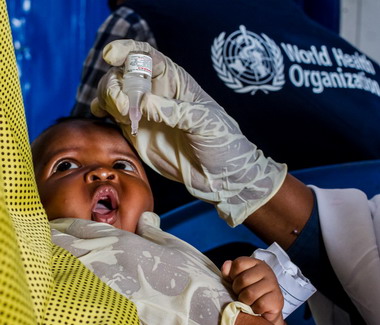
23 April 2020 – The number of confirmed COVID-19 cases continues to rise in Somalia, including associated deaths attributed to coronavirus disease. While the number of cases increase, there is increasing demand on the health system for patient care. When health systems are strained and overwhelmed, especially in fragile and vulnerable settings like in Somalia where adequate mechanical ventilators and other critical care support for patient care are basic, rudimentary or absent, mortality from the outbreak may increase substantially over time. Since the beginning of the outbreak, 7 associated deaths out of 135 cases were reported by the Government in Somalia as of 19 April 2020.
The COVID-19 epidemic in Somalia will disrupt life-saving health services and health care resources, including essential supplies and health manpower, need to be re-prioritized and re-directed towards reducing mortality as a result. It is also crucial to maintain other life-saving health services particularly maternal and child essential health care services and services for other vulnerable groups. During the 2014–2015 Ebola outbreak, analyses suggest that the increased number of deaths caused by measles, malaria, HIV/AIDS, and tuberculosis attributable to health system failures exceeded deaths that were directly attributable to Ebola virus disease. If viral transmission cannot be decreased, a patient surge and increasing demand for care could be overwhelming, putting an enormous strain on the fragile health system and severely impacting other life-saving services such as immunization, maternal care and other services aimed at limiting deaths from preventable diseases.
Maintaining key health interventions
Over the years, the country has made several health sector gains. The country has remained free from wild poliovirus since 2014. Without maintaining time-sensitive and active surveillance system for acute flaccid paralysis (AFP) throughout the country, including environmental surveillance, polio could resurge. In 2019, WHO staff from the polio eradication programme helped reach over 3 million children under 5 with lifesaving polio vaccine, collected 75 sewage samples and also detected 361 AFP cases. If these polio activities are not maintained or sustained even during this period of COVID-19, this will push back all the gains made over the years in the country to end polio.
Maintaining essential health services during this ongoing COVID-19 outbreak will also be critical to save lives from other ongoing infectious diseases threats in the country such as measles and cholera. The cholera outbreak continues to kill and so far in 2020, cholera has claimed 11 lives and made another 2600 people sick. Any disruption of essential care and other key health interventions for managing cholera and other infectious disease threats may lead to an upsurge of cases and excess deaths. Maintaining these critical and life-saving services is the only way to end cholera by 2030 and limit avoidable deaths from this disease by 90%.
Dr Mamunur Rahman Malik, the WHO Representative for Somalia said, “While there is a need to fight with this virus on all fronts, we also need to ensure that essential health services are maintained to save lives. Our gains in protecting children against vaccine-preventable diseases, our victory in eradicating polio virus from the country, our focus on leaving no one behind in our efforts to achieve universal health care coverage will be lost forever if we can not support the health system to meet the increased demand for health care for COVID-19 and yet maintain the health services that are life saving in nature. Countries will need to make difficult decisions to balance the overwhelming demands of responding directly to COVID-19, while simultaneously engaging in coordinated action to maintain essential health service delivery”.
Partners
Working in partnership with other United Nations agencies such as the United Nations Children’s Fund (UNICEF), United Nations Population Fund (UNFPA), International Organization for Migration (IOM), the United Nations Office of the High Commissioner for Refugees (UNHCR) and the United Nations World Food Programme (WFP), the country office is supporting health authorities to improve and maintain essential health services for mothers, women, children, people with physical disability and older people, especially in internally displaced and refugee camps while balancing, the extra demand to respond to COVID-19. The primary health care centres which are the bedrock of essential health care in Somalia have been supported with personal protective equipment for the health care workers managing these centres as an incentive to keep them open while making sure that workers have the training and knowledge to do triage for COVID-19 for high-risk patients, refer them to other facilities and maintain routine health care services.
Surveillance
While EWARN – the early warning disease surveillance system – currently covering 535 out of 1075 health facilities in the country with an estimated 6.5 million population coverage, has been expanded to cover not only 14 epidemic-prone diseases, but to include the case definition of COVID-19 as another reportable health condition. The system enhancement has allowed WHO to monitor the trend of severe acute respiratory infection as a proxy for COVID-19, but the addition of distinct case definition of COVID-19 in the EWARN has been useful to capture any suspected case early.
Maintaining the routine immunization services for childhood diseases remain another key challenge, especially during physical distancing. However, efforts are under way to support health facilities deliver immunization services yet maintain social/physical distancing. A country where one in every 10 children does not receive life-saving vaccines, the suspension or breakdown of routine immunization services will have a devastating toll on the lives of vulnerable children in the country. Last year, WHO supported health authorities to reach out to every child with life-saving vaccines resulting in reaching out to 462 050 children under 1 year out of 602 195 (77%) completing the 3 doses of the pentavalent vaccine, while 430 275 (71%) received the measles-1 vaccine. Any disruption of routine immunization services will be a severe set back in making every child count.
A well-organized and prepared health system has the capacity to maintain equitable access to essential service delivery throughout an emergency, limiting direct mortality and avoiding increased indirect mortality. With the current situation of COVID-19 where caseloads are increasing and the pressure is mounting on the health system, the capacity to maintain routine service delivery, in addition to managing increased demand for COVID-19 patient care, needs to be maintained at any cost to protect the health gains achieved over the year. The WHO country office is supporting that to happen through strategic shifts ensuring that increasingly limited resources provide maximum benefit for the population.
Related links
Access the latest information and global updates
Our operations response to COVID-19 is supported by ECHO, United Kingdom Department for International Development, United Nations Central Emergency Response Fund, Embassy of Switzerland and Italian Development Cooperation.
As cases of COVID-19 increase in Somalia, operational readiness also scaled up to early detect and respond to community transmission
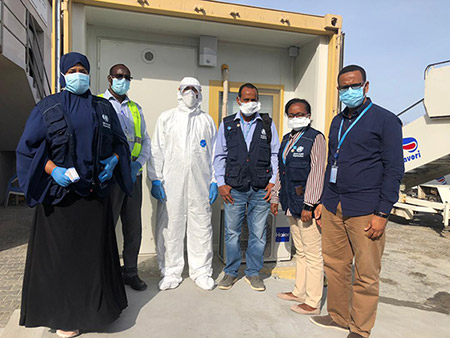 In the absence of testing facilities for COVID-19, the WHO staff are involved in safe packaging and transportation of samples collected across the country to the testing laboratory at KEMRI. So far, over 50 samples from the suspected cases have been collected and tested at the refence laboratory for COVID-19 The WHO country office is supporting the Ministry of Health and Human Services of the Federal Government of Somalia, as well as all state health authorities to scale up operational readiness for early detection and response to large scale community transmission from coronavirus disease (COVID-19).
In the absence of testing facilities for COVID-19, the WHO staff are involved in safe packaging and transportation of samples collected across the country to the testing laboratory at KEMRI. So far, over 50 samples from the suspected cases have been collected and tested at the refence laboratory for COVID-19 The WHO country office is supporting the Ministry of Health and Human Services of the Federal Government of Somalia, as well as all state health authorities to scale up operational readiness for early detection and response to large scale community transmission from coronavirus disease (COVID-19).
As of 6 April, the government has officially reported 7 laboratory-confirmed cases of COVID-19, 2 of these cases were reported from Somaliland. While 6 of these reported cases have travel history before they became sick or were quarantined, the investigation on the remaining case suggests that the case might have been locally acquired as the case has no travel history. This clearly shows that the country is now entering into a different transmission phase where further human-to-human transmission from COVID-19 can be expected. Given the fragility of the health systems, security situation in the country, weak surveillance system and insufficient number of skilled health workforce in the country, there are heightened risk that cases may go undetected or undiagnosed if community transmission begins as a result of wide spread of the virus.
Since the beginning of COVID-19 outbreak in January 2020, WHO has geared up its preparedness and operational readiness measures in the country helping the government to pre-position personal protective equipment for the first responders and health care workers to treat an initial 500 cases, train over 800 health care workers on early recognition, detection and investigation of cases, expand its early warning disease surveillance system to pick up the suspected cases rapidly, support the establishment of screening facilities at 21 designated points of entry across the country to cover over 75 000 returnee travellers and above all facilitating testing of the COVID-19 cases using the BSL-2 laboratory facilities at the Kenya Medical Research Institute (KEMRI) in Nairobi.
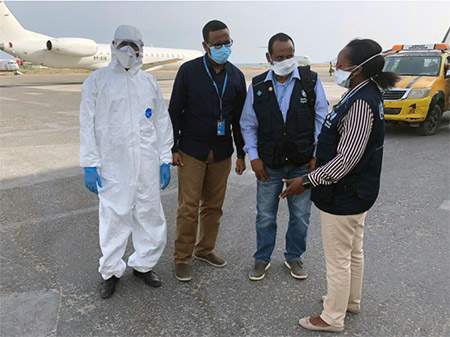 As the cases gradually build up and the country moves to a different epidemiological transmission patterns where human-to-human transmission is more likely, the priority for now is to avert large-scale community transmission through scaling up testing of all suspected COVID-19 cases, irrespective of travel history, aggressive contact tracing and efficient management of all close contacts using appropriate measures such as isolation and quarantine of all suspected cases and close contacts and scaling up risk communication activities to target the high-risk population.
As the cases gradually build up and the country moves to a different epidemiological transmission patterns where human-to-human transmission is more likely, the priority for now is to avert large-scale community transmission through scaling up testing of all suspected COVID-19 cases, irrespective of travel history, aggressive contact tracing and efficient management of all close contacts using appropriate measures such as isolation and quarantine of all suspected cases and close contacts and scaling up risk communication activities to target the high-risk population.
In the coming days, WHO’s support will also include setting up 3 testing facilities in the country, additional isolation facilities to cover over 1000 suspected cases and mobilizing over 1200 trained health workforce for contact tracing and contact management. WHO’s work continues in Somalia to keep the country safe and protect the vulnerable despite the weakened health systems ravaged by years of war and neglect.
Saving Somali children from vaccine-preventable diseases
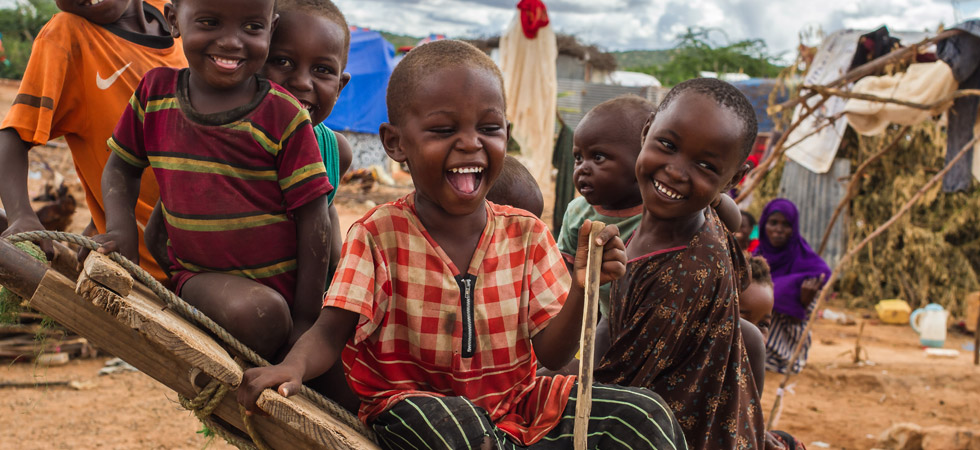
8 December 2019 – The first phase of a nationwide integrated polio and measles vaccination campaign has concluded in Somalia having achieved high coverage. WHO in collaboration with the Federal Ministry of Health and UNICEF launched the first phase of the campaign from 24 to 28 November 2019, targeting more than 1.7 million children under the age of five for polio vaccination and more than 1.5 million children aged six to 59 months for measles vaccination and vitamin A supplementation. This is the first time that an integrated campaign such as this has happened in Somalia. Vaccinators went from door to door to reach every child with life-saving vaccines, leaving no one behind.
The campaign was particularly focused on children in districts with high concentrations of internally displaced persons and nomadic communities due to the need to improve routine immunization coverage among these populations and reach those missed during routine immunization programmes. These population groups often have higher mobility and are therefore at increased risk for transmission of these diseases.
More than 17 000 skilled community vaccinators, frontline health workers and social mobilizers took part in the campaign. At the end of it, a total of 751,811 children had received polio vaccine (84% of the target), 671,381 had received the measles vaccine (82% of the target), 481,332 (66% of the target) had received deworming tablets and 666,182 children (82% of the target) had received vitamin A capsules. A total of 20,000 children also received their first dose (zero dose) of vaccine. The remaining unvaccinated children of the 1.7 million targeted for polio vaccination and the more than 1.5 million targeted for the measles vaccine will be reached during the second phase of the campaign in December.
During the campaign, staff from the Federal Ministry of Health, WHO, UNICEF and nongovernmental partners were deployed in different districts to monitor the campaign. All had been trained prior to the campaign on supportive supervision, conducting parent surveys and making rapid convenience assessments.
As part of campaign monitoring, 1656 households were visited and 5042 children (under the age of 5) were assessed for both polio and measles vaccination through a three-way verification process: recall, fingermark and presence of vaccination card. Social mobilization prior to the campaign demonstrated high success, with 980 mothers surveyed at vaccination sites during the campaign reporting bringing 95% of their children to the sites and 92% were aware of the campaign before it started. Only 79 fever and rash cases amongst the vaccinated children were reported by the mothers during the survey. No other adverse event following immunization were reported during the campaign.
Every year over 170,000 Somali children miss out on life-saving vaccines. This means that one in every 10 children do not receive life-saving vaccines. Unacceptably, it is often those most at risk – the poorest, the most marginalized, and those affected by conflict or forced from their homes – who are persistently missed.
Integrated vaccination campaigns are important for increasing immunity among children and avoiding the devastating consequences of these entirely preventable diseases on individuals, families, the local economy and health security in the Region.
The nationwide integrated campaign for measles and polio vaccination was funded by Gavi, the Vaccine Alliance. WHO thanks Gavi and other partners for supporting the routine immunization programme in Somalia.
1.7 million Somali children to be reached with life-saving vaccines
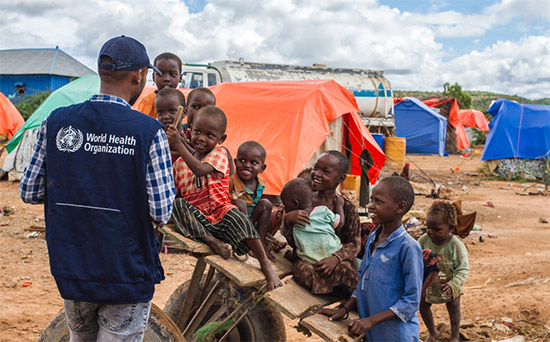 MOGADISHU, 24 November 2019 - Health authorities launched today a campaign to vaccinate 1.7 million children against measles and polio in Benaadir, Galguduud, Hirshabelle, Jubaland and South West State, Somalia.
MOGADISHU, 24 November 2019 - Health authorities launched today a campaign to vaccinate 1.7 million children against measles and polio in Benaadir, Galguduud, Hirshabelle, Jubaland and South West State, Somalia.
The 5-day campaign, running from 24 to 28 November, will target children under the age of 5 with polio vaccines and children aged 6 to 59 months with measles vaccines. The vaccination campaign, conducted in partnership with the Somali government, World Health Organization (WHO) and United Nations Children’s Fund (UNICEF), also includes a vitamin A supplement for children under 5 to boost their immunity as well as de-worming tablets.
The measles virus is spread by respiratory transmission and is highly contagious. Up to 90% of people without immunity who are sharing a house with an infected person will catch it. As of 9 November, 3616 suspected measles cases have been reported in Somalia in 2019.
Somalia also continues to respond to a vaccine-derived polio outbreak. Three vaccine-derived polio cases have been confirmed in the country in 2019 and 15 children have been paralysed since the onset of the latest outbreak in 2017.
“One among 7 Somali children dies before their fifth birthday and many of these deaths are preventable by use of vaccines. Although we have made progress over the years to improve routine immunization coverage in the country, there is an urgent need to further scale up the vaccination coverage, especially for measles and polio, by working together with partners, communities and grass-root level organizations. The integrated campaign for measles and polio is expected to improve routine immunization coverage and reach out to those who are missed out during routine immunization programme,” said WHO Representative Dr Mamunur Malik.
The campaign targets particularly children in districts with high concentrations of internally displaced persons and nomadic communities. These population groups often have higher mobility, and so are at increased risk for transmission of these diseases.
“Crowded living conditions, malnutrition and limited access to water and sanitation in the camps and other sites breed disease and put children at grave risk,” said UNICEF Somalia Representative Werner Schultink. “To protect these children, it is critical to reach them with life-saving vaccines.”
The campaign aims to stem the transmission of measles infection and reduce the likelihood of future measles outbreaks in Somalia. Adding polio vaccine to the campaign will also help to bolster protection against polio virus type 1 and 3 among all Somali children.
More than 17 000 skilled community vaccinators, frontline health workers and social mobilizers are implementing the campaign.
Integrated campaigns are important to raise immunity among children and avoid the devastating implications of these entirely preventable diseases on individuals, families, the local economy and health security in the region.
About WHO
The World Health Organization is a specialized agency of the United Nations whose vision is the attainment by all peoples of the highest possible level of health.
Follow WHO Somalia on Twitter.
About UNICEF
UNICEF works in some of the world’s toughest places, to reach the world’s most disadvantaged children. Across 190 countries and territories, we work for every child, everywhere, to build a better world for everyone. Follow UNICEF Somalia on Twitter and Facebook.
About GPEI
The Global Polio Eradication Initiative is a public-private partnership led by national governments and spearheaded by the World Health Organization (WHO), Rotary International, the US Centers for Disease Control and Prevention (CDC), the United Nations Children’s Fund (UNICEF), the Bill & Melinda Gates Foundation (BMGF), and Gavi, the Vaccine Alliance, working towards a future where no child will ever again be paralysed by polio.
For more information, please contact:
Leila Abrar, UNICEF Somalia, Polio Communications for Development Specialist,
Eva Hinds, UNICEF Somalia, Communication Manager,
Fouzia Bano, WHO Somalia, Communication Officer,
Dr Kamil Mohamed, WHO Somalia Polio Team Lead Email:
Dr Farid, WHO Medical Officer, Email:


